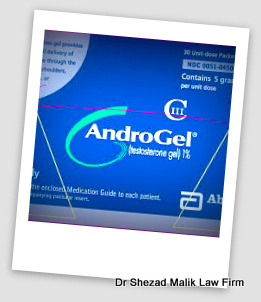According to recent medical research, testosterone supplement treatments for men can cause an increased risk of stroke, heart attack or even death. The use of testosterone replacement therapy, more commonly referred to as “low T” drugs, has exploded recently to include men showing no symptoms of hypogonadism at all, and some with only vague age related symptoms, such as tiredness and irritability.

What is Testosterone therapy?
Testosterone treatment is only approved by the FDA to treat men with documented medical evidence of low testosterone blood levels, known as hypogonadism.
Because of aggressive direct to consumer marketing, many doctors are prescribing testosterone to men to combat the natural decline in testosterone as they age. It allegedly improves sex drive, strengthen bone density and build muscle mass. This off label use of the drug by doctors is a cause for concern and not subject to FDA review.
FDA Warning and Investigation
A panel of FDA advisors is scheduled to meet later in September to determine what regulatory actions should be taken to protect consumers from Testosterone side effects.
FDA experts have expressed concerns over men with age-related drops in testosterone levels who are being prescribed testosterone medications like AndroGel, Axiron, and Testim without any benefits from the testosterone supplements.
The FDA announced that it evaluate the available data on potential side effects of testosterone replacement therapy and how to proceed on collecting more information about the heart risks.
Many men have been prescribed testosterone medications like AndroGel and Testim for what the FDA calls “age-related hypogonadism”, where testosterone levels drop due to the natural effects of getting older.
“Serum concentrations of testosterone decrease as men age. This decline is usually modest but testosterone concentrations can fall below the lower limit of the normal range for younger, healthy men. This phenomenon is sometimes referred to as ‘andropause’ or ‘age-related hypogonadism’. Furthermore, aging men often experience many of the signs and symptoms that are associated with hypogonadism, including decreases in energy level, sexual function, bone mineral density, muscle mass and strength, and increases in fat mass. Whether these symptoms are a clinical consequence of the age-related decline in endogenous testosterone has not been established, and therefore the need to replace testosterone in these older men remains debatable.”
The FDA found that in 2010, 1.3 million men had received testosterone prescriptions. By 2013, that number had increased to 2.3 million. The largest increase was among men age 40 to 64, jumping from 850,000 in 2010 to 1.5 million by 2013.
Only about half of the men taking testosterone supplements appear to have been diagnosed with hypgonadism, and “25% did not have evidence of having their testosterone concentrations tested prior to initiating therapy,” the report notes.
Testosterone Side Effect Lawsuits Mounting
Most of the complaints involve similar allegations, claiming drug makers aggressively promoted testosterone treatments for men who had no real medical need. Plaintiffs allege that use of testosterone drugs caused them to suffer a heart attack, stroke, deep vein thrombosis, pulmonary embolism or other serious injury, including many wrongful death lawsuits.
Federal Multidistrict Litigation
In June 2014, the U.S. Judicial Panel on Multidistrict Litigation (JPML) has consolidated all federal low T drug lawsuits as part of a multidistrict litigation (MDL). The MDL has been centralized before U.S. District Judge Matthew F. Kennelly in the Eastern District of Illinois to coordinate all testosterone lawsuits against the different manufacturers.
According to most recent court documents there are at least 156 product liability lawsuits centralized before Judge Kennelly. According to legal experts, several thousand lawsuits will be filed against the different manufacturers.






